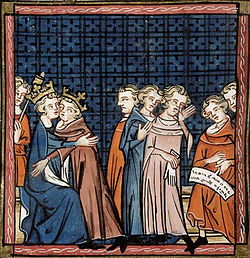Treaty of Le Goulet
The Treaty of Le Goulet temporarily ended the power struggle between the English King John Ohneland and the French King Philip II over the parts of the Angevin Empire in France .
After many years of fighting, Johann's predecessor and brother Richard the Lionheart had already concluded an armistice with Philip II in January 1199. After the unexpected death of Richard the Lionheart during the siege of Châlus Castle in April 1199, Philip II tried again to occupy Normandy . To this end, he had supported John's nephew Arthur , who had raised hereditary claims to parts of the Angevin empire, especially the Anjou , Maine and Touraine . However, Johann had been able to hold his own in Normandy, and after winning Guillaume des Roches , the most powerful baron of Anjou, on his side, Philip II was ready to conclude an armistice with him.
After several weeks of negotiations in January 1200, the peace treaty between the two monarchs was concluded on May 22, 1200 on the island of Le Goulet near Vernon in the Seine . In the treaty, the French king accepted John as heir of the mainland possessions of the Angevin Empire. In return, Johann recognized the French king as his liege lord for his possessions in France. He had to cede some border areas of his empire such as the county of Évreux , most of the Vexin and the Berry to the French king. In return, Johann's nephew Arthur had to give up his inheritance claims and to take the oath of fief to his uncle as Duke of Brittany .
A marriage confirmed the agreement: the future King Louis VIII was betrothed to Blanka of Castile , a niece of John. Blanka brought the gentlemen of Châteaudun , Issoudun and Graçay into the marriage.
In return for the official enfeoffment with his French possessions, Johann had to pay 20,000 marks to Philip II. This payment corresponded to the current feudal law, but neither John's brother Richard nor his father Heinrich II had ever had to make such a payment to the French king as their overlord. In addition, Johann had to establish his alliances with Count Baldwin IX. von Flanders and Rainald von Boulogne , who were vassals of the French king.
The treaty strengthened John's position in France, but was ultimately a success for the French king. Even contemporaries complained that the English king had paid too high a price for the recognition of his heritage in France. Two years later, the war between the two monarchs began again.
literature
- Wilfred L. Warren: King John . University of California Press, Berkeley 1978. ISBN 0-520-03610-7
Individual evidence
- ↑ Wilfred L. Warren: King John . University of California Press, Berkeley, 1978. ISBN 0-520-03610-7 , p. 56
- ^ John Gillingham: John (1167-1216) . Oxford Dictionary of National Biography, Oxford University Press, 2004. Retrieved December 1, 2014 .
